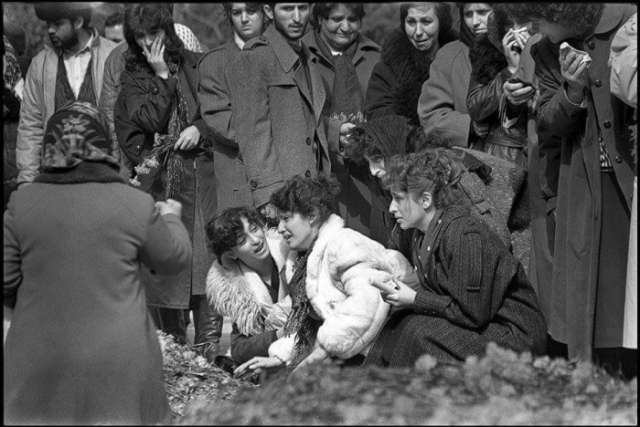The victims’ only crime was to demand freedom for Azerbaijan from the Soviet Union: proof that the Soviet authorities were presiding over a collapsing empire, and that Azerbaijan was leading the fight for freedom. The Baku uprising was the first occasion in the USSR in which a whole city had risen up against Soviet occupation – and the first in which the authorities used such overwhelming force, including tanks and helicopters, to kill protesters and innocent civilians. Through this massacre Mr Gorbachev’s regime was determined to crush the Azerbaijani people's fight for freedom and intimidate others.
However, the brutal regime utterly failed. After the massacre, which entered the history books as Black January, around a million Azerbaijanis – young and old, men and women, Muslims, Jews and Christians - filled the streets to mourn the victims, and a general strike in honor of the dead shut down the city for 40 days. Heydar Aliyev, who would become later the founder of the modern Azerbaijan, came to Soviet Azerbaijan’s Permanent Mission in Moscow and fiercely denounced the bloodshed. His defiance helped to inspire the Azerbaijani people and Aliyev became a leader of the struggle for liberty.
The force could not stop the people of Azerbaijan from seeking their freedom. In fact, it only increased their resolve to re-establish a free and independent Azerbaijan.
The independence was finally restored on October 18, 1991, as the USSR collapsed, in part because of the callousness of Black January and the resulting crisis of legitimacy for the Soviet authorities. A massacre intended to shore up the empire ended up contributing to its demise. Many historians now agree that Black January marked the beginning of the end of the Soviet Union.
Since the restoration of independence, Azerbaijan has gone from strength to strength. Azerbaijan is now economically dynamic, politically stable, and an important geopolitical power. It is the biggest economy in the South Caucasus, and one of the biggest in the whole of the former Soviet Union. International investors have been attracted by the country's business climate, and Azerbaijan is the centerpiece of the Caspian oil and gas developments, vital for global energy security, as well as other regional megaprojects.
Baku, which was consumed by the sound of gunfire in Black January, now resounds to the sound of construction as the city is transformed into a vibrant and modern community. The streets which once saw Soviet tanks are now filled with Azerbaijanis passionate and determined about their country’s freedom and independence.
Ironically, Alfred Nobel would not have been able to establish the Nobel Prize in 1901, had it not been the immense fortune he and his brothers made with oil development in Baku. And Alfred Nobel would not have been able to even dream that his Prize would one day be awarded to a man who turned the very city of Baku into a bloodbath.
On January 20, the people of Azerbaijan will mark the 25th anniversary of the tragedy of Black January and pay tribute to its martyrs. But they will also commemorate the achievements in the years since as an independent nation, and acknowledge that January 20, for all its bloodshed, was a first and vital step towards Azerbaijan's freedom.
Aghayev is Azerbaijan’s consul general to the Western United States.
Read original article on the Hill.
More about: #BlackJanuary
















































